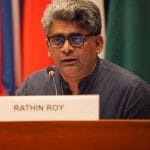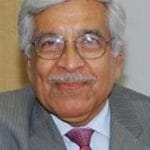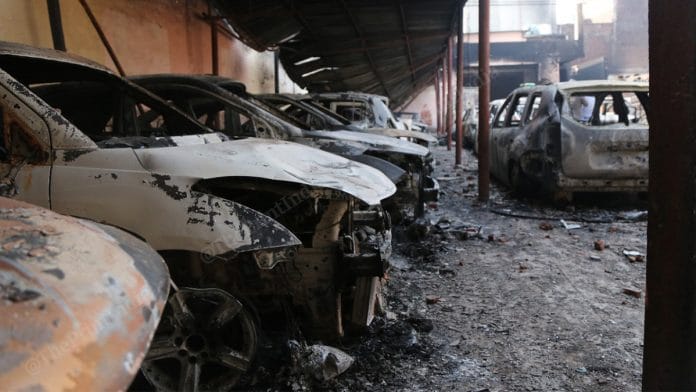 How India is failing its Muslims
How India is failing its Muslims
Yamini Aiyar | President and chief executive, Centre for Policy Research
Hindustan Times
Aiyar argues that anxiety and vulnerability are emerging in the political and social life of Muslims in India following the Citizenship Amendment Act (CAA). She argues that the sloganeering and the violence following the CAA have pushed Muslims “deeper into the margins”. According to Aiyar, “Muslims have chosen the Constitution as their means of protest” as political parties like the AAP have not supported them, fearing loss of political ground.
 Why Delhi burned
Why Delhi burned
Abhinav Kumar | The writer is an IPS officer serving in Uttarakhand
The Indian Express
Kumar criticises the police, the courts and the media for the Delhi riots. He notes that these riots were a result of “systemic failures” that need to be addressed and corrected. According to him, there are some institutional mechanisms that need to be fixed — the police leadership needs to step up and regain public confidence, the courts need to dispense justice quickly and make sure that police receive adequate backing in such cases and the media needs to have the “guts to say no to the ruling party”.
 Economic lessons of coronavirus
Economic lessons of coronavirus
Rathin Roy | Director, National Institute of Public Finance and Policy
Business Standard
The coronavirus outbreak, Roy argues, has brought to fore “important lessons” for economists. These lessons include the recognition that globalisation brings structural risks that need to “analytically recognised”, macroeconomic intervention will not counter these risks, decentralised supply chains will become competitive because of risks to “locational monopolies” due to coronavirus, the “demise of multilateralism” needs to be reversed and the increasing importance of domestic demand and “frugal logistics”. A frugal logistics chain “promotes both decentralised supply and lower risk of disruption,” he writes.
 Higher education revolution: The following set of reforms would make Indian universities world class
Higher education revolution: The following set of reforms would make Indian universities world class
Arvind Panagariya | Professor of Economics at Columbia University
The Times of India
Panagariya comments on the upcoming new education policy. He applauds the policy for recommending “full autonomy to higher education institutions in areas such as administration, teaching, research, curriculum setting and foreign collaboration” but criticises the regulatory framework and structures which may be “complex and unwieldy to yield the desired outcome”. He gives suggestions on the structure of the regulatory framework and advises the government to focus on humanities where “India has lost much ground to other countries, especially China, in the past two decades”.
 After the Trump visit
After the Trump visit
Yoginder K. Alagh | The writer, a former Union minister, is an economist
The Indian Express
Alagh comments on India-US relations and Trump’s visit to India recently. Trump’s visit came at a time when the two countries are facing trade tensions and political tension, however, Alagh argues that such tensions are bound to emerge between them and they must “ignore blips in relations and talk business”.
Auditors and fraud
Ashok Mahindra | Former senior partner, A F Ferguson & Co. and assisted the defendants in the Tri-Sure case
Business Standard
Mahindra calls for a “dialogue between the government and the leaders in the auditing profession”. The high expectations of auditors coupled with the “current aggressive regulatory mindset” makes for a “high-risk environment”, he explains.
 The role of women in developing a knowledge economy
The role of women in developing a knowledge economy
Swati Piramal | Vice-chairperson, Piramal Group
Mint
Parimal discusses the challenge of gender imbalance in science and technology in India, be it women’s “lack access to informal networks” or otherwise. If India aims to be a $5 trillion economy, it requires a “highly skilled technical workforce” and a gender-balanced one, she explains. Only then can it develop into a “knowledge economy”, she adds.
 Moving up in ‘ease of resolving insolvency’
Moving up in ‘ease of resolving insolvency’
M.S. Sahoo | Chairperson, Insolvency and Bankruptcy Board of India
The Hindu Business Line
Sahoo points out that may “value-added features” have been added to the ‘insolvency framework’ in order to strengthen its implementation. These features include cross-border insolvency, market for distressed assets, automation of loan contracts etc. However, there is more work to be done if the Insolvency and Bankruptcy Code (IBC) is to be “in sync with the emerging market realities,” he adds.
Human Rights Pay
Hardayal Singh | Income-tax ombudsman, Mumbai
The Economic Times
Singh discusses the proposed charter of taxpayers’ rights in the Income-Tax (I-T) Act. With the institution of I-T ombudsman, the government failed to “redress grievances promptly” and appointments were “mere sinecure for retired bureaucrats”, he explains. If these attitudes fester, the “reform potential of the charter will remain totally unrealised”, he warns.
Rate of transmission
Saugata Bhattacharya | Senior VP, Business and Economic Research, Axis Bank
Financial Express
Bhattacharya discusses transmission to bank lending rates, and argues that the extent of this is not “consistent with the steep cuts in the policy repo rate, abundant liquidity, a series of measures by RBI and other policy authorities to revitalise credit”. He compares the current (2019) rate cycle with the 2015 one to show that “sticky small savings deposit rates” were the main reason behind the 2019 rate cut cycle.
Today’s Editorials
The Indian Express: Express notes that it is disturbing that the Supreme Court denied hearing activist Harsh Mander’s petition against those who made hate speeches, because of a speech he made in December. The apex court which has shown a big heart in many of the cases, now appears thin-skinned which is a chilling signal. Putting an activist with a formidable record of civic action in the dock instead of the many guilty men of Delhi seems to be a waste of the court’s time and energy, writes the daily.
Hindustan Times: The communal riots in Delhi prove that Hindu-Muslim relations are fragile and other states should be careful, states HT. States like Bihar, West Bengal and Assam have seen some communal tension in the past and also have a history of political violence. These states should be well prepared in advance to nip the brewing communal tensions, recommends the paper.
The Hindu: The behaviour of Delhi Police and other arms of the state during the Delhi riots cannot be justified, writes Hindu. The police also came under attack and their men were lost but that is not an excuse for their failure to maintain order during the riots. India needs an assurance that its security forces will uphold the rule of law at all costs and not allow themselves to be manipulated by ruling establishment, writes the daily.







India has no obligation to people with Arabic names, get this into your Ms Yamini Aiyar. They can leave this country for our west neighbor